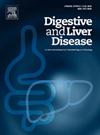与磷脂酰肌醇3-激酶δ抑制剂相关的严重小肠结肠炎:一项多中心队列研究
IF 3.8
3区 医学
Q1 GASTROENTEROLOGY & HEPATOLOGY
引用次数: 0
摘要
磷脂酰肌醇3-激酶-δ (PI3Kδ)抑制剂已被批准用于治疗慢性淋巴细胞白血病和非霍奇金淋巴瘤,并可能导致小肠结肠炎。患者和方法:这是一项多中心、回顾性队列研究。连续使用PI3Kδ抑制剂治疗发生严重小肠结肠炎的患者。结果:2014年至2023年间,133例暴露于PI3Kδ抑制剂的患者中有31例(23%)患有严重的小肠结肠炎。其中71%的患者需要住院治疗,64%的患者体重减轻,39%的患者出现急性肾损伤。内镜下病变轻微15/19,浅溃疡4例。所有病例结肠活检病理检查均异常。最常见的病变为中性粒细胞隐窝炎、隐窝脓肿、隐窝上皮细胞凋亡和隐窝结构异常。24例(77%)停用PI3Kδ抑制剂。在第30天,0/7继续使用pi3k δ抑制剂的患者和所有停止使用pi3k δ抑制剂的患者实现了临床缓解(p < 0.001),在停止治疗时添加强的松或布地奈德没有任何益处。恢复半剂量PI3Kδ抑制剂的7例患者中有4例(57%)腹泻复发。结论:与PI3Kδ抑制剂相关的严重小肠结肠炎是常见的,并且对停药有反应。类固醇似乎没有提供额外的好处。再挑战往往伴随着复发。本文章由计算机程序翻译,如有差异,请以英文原文为准。
Severe enterocolitis associated with phosphatidylinositol 3‐kinase delta inhibitors: A multicentre cohort study
Introduction
Phosphatidylinositol 3‐kinase-δ (PI3Kδ) inhibitors have been approved for treatment of patients with chronic lymphocytic leukemia and non-Hodgkin’s lymphomas and may lead to enterocolitis.
Patients and methods
This is a multicenter, retrospective cohort study. Consecutive patients treated with PI3Kδ inhibitors who developed severe enterocolitis.
Results
Between 2014 and 2023, 31 out of 133 (23 %) patients exposed to PI3Kδ inhibitors had severe enterocolitis. Among them, 71 % required hospitalization, 64 % experienced weight loss and 39 % of patients had acute kidney injury. Endoscopic lesions were mild in 15/19 patients while four patients had shallow ulcers. Histopathological examination of colonic biopsies was abnormal in all cases. The most common lesions were neutrophilic cryptitis, crypt abscesses, crypt epithelial cell apoptosis and crypt architectural abnormalities. PI3Kδ inhibitors were discontinued in 24 cases (77 %). At day 30, clinical remission was achieved in 0/7 patients who continued PI3Kδ-inhibitor and in all patients who discontinued PI3Kδ-inhibitor (p < 0.001) with no benefit of adding prednisone or budesonide to treatment discontinuation. Relapse of diarrhea occurred in four out of seven (57 %) patients who resumed half-dosed PI3Kδ inhibitor.
Conclusion
Severe enterocolitis associated with PI3Kδ inhibitors is frequent and respond to drug withholding. Steroids do not seem to provide additional benefits. Rechallenge is often accompanied by a relapse.
求助全文
通过发布文献求助,成功后即可免费获取论文全文。
去求助
来源期刊

Digestive and Liver Disease
医学-胃肠肝病学
CiteScore
6.10
自引率
2.20%
发文量
632
审稿时长
19 days
期刊介绍:
Digestive and Liver Disease is an international journal of Gastroenterology and Hepatology. It is the official journal of Italian Association for the Study of the Liver (AISF); Italian Association for the Study of the Pancreas (AISP); Italian Association for Digestive Endoscopy (SIED); Italian Association for Hospital Gastroenterologists and Digestive Endoscopists (AIGO); Italian Society of Gastroenterology (SIGE); Italian Society of Pediatric Gastroenterology and Hepatology (SIGENP) and Italian Group for the Study of Inflammatory Bowel Disease (IG-IBD).
Digestive and Liver Disease publishes papers on basic and clinical research in the field of gastroenterology and hepatology.
Contributions consist of:
Original Papers
Correspondence to the Editor
Editorials, Reviews and Special Articles
Progress Reports
Image of the Month
Congress Proceedings
Symposia and Mini-symposia.
 求助内容:
求助内容: 应助结果提醒方式:
应助结果提醒方式:


